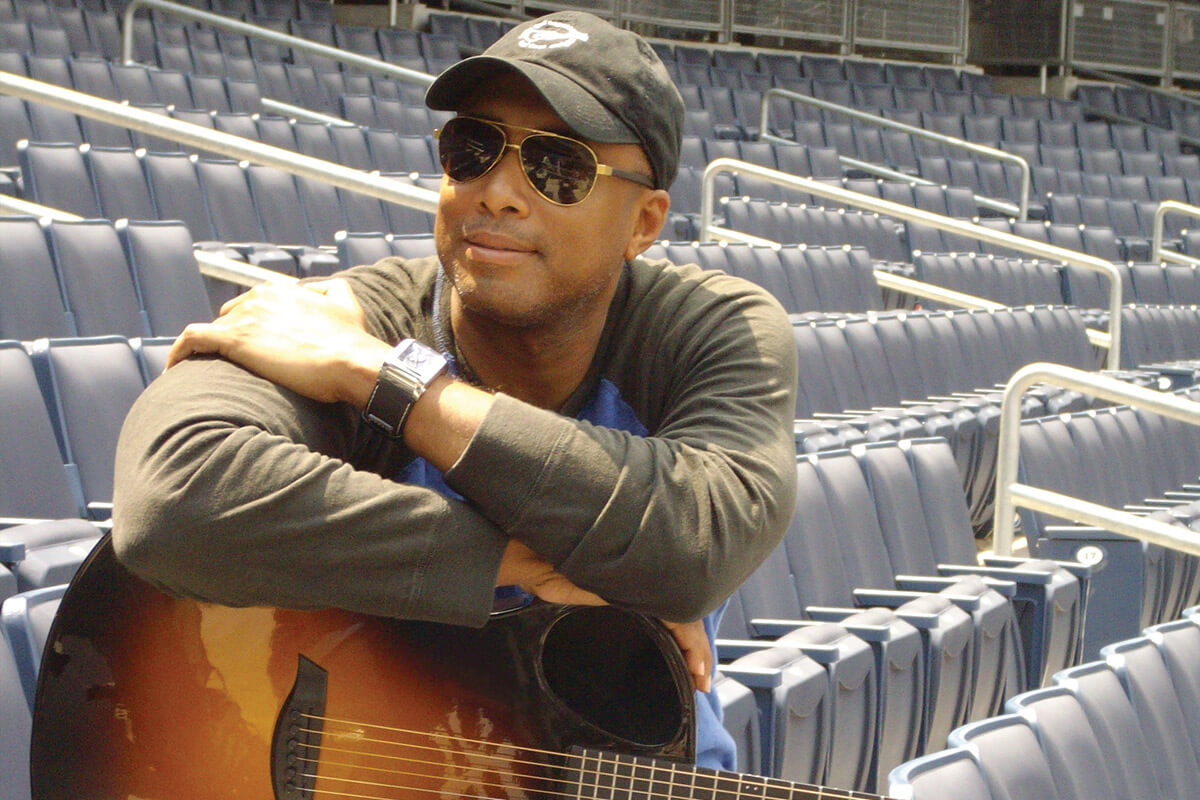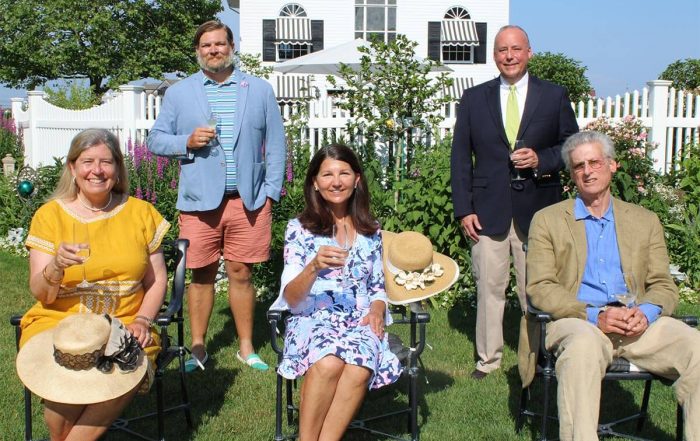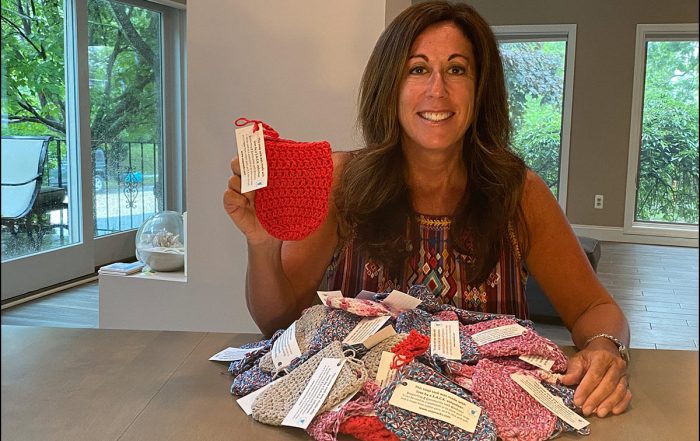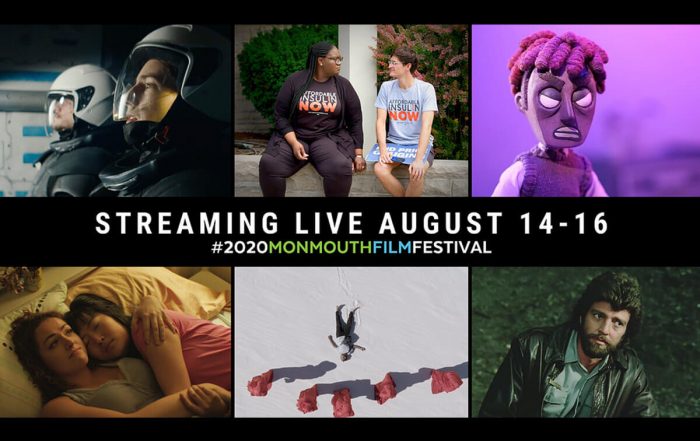FEATURED PHOTO: Bernie Williams | CREDIT: Steve Fortunato, Fortch Unlimited Inc.
Grunin Center Hosts Bernie Williams
Bernie Williams truly needs no introduction when it comes to his amazing 16-year career as the switch-hitting center fielder for the NY Yankees. But what are the chances that such an accomplished athlete would emerge a gifted Latin Jazz musician?
The Grunin Center is host to Bernie Williams and his All-Star Band with a post-concert meet and greet this month. CM spoke with Bernie to learn about his journey from star athlete to jazz guitarist/composer and even about his very brief acting career on Seinfeld. And with all of this, Bernie still makes time for philanthropy. Here are excerpts from our interview with the warm and personable Bernie Williams.
CM: There is a great deal of interest in how you made and handled the transition from the professional baseball world to music.
Bernie Williams (BW): There are a lot of similarities. The things I had to do to be successful in sports are the things I have to do to be successful in music – the work ethic, not really dwelling on your mistakes and learning from them.
CM: Bruce Springsteen alluded to the transition when you joined him on stage: “Bernie may be old for baseball but he’s a spring chicken for rock and roll.” Are you feeling that, and is touring exhausting?
BW: (Laughs) I am not doing a lot of touring when it comes to music. In summer and fall I tend to be a little bit more active as far as performing. But I have this great opportunity to do things with music that are beyond the stage or recording studio. I do a lot of advocating for music education. I do corporate and charity events and I’m working to raise awareness about IPF (Idiopathic Pulmonary Fibrosis). That brings me to stadiums to play the anthem and Take Me Out to the Ballgame. I am utilizing music and my popularity as a former baseball player to reach out so the music is a vehicle to do all these other things.
CM: Your rendition of Take Me Out to the Ballgame on your CD with the voice of Bob Sheppard (Yankees announcer) is special. My son had brought a sign to a Yankees game as kids do, but his said “Bob Sheppard Rules”. What was it like to work with the beloved Mr. Sheppard?
BW: He did?! (Big laugh) That particular voiceover Bob Sheppard did for the track was, I believe, the last thing he did before he passed away. To have his voice associated with any of my work is certainly an honor.
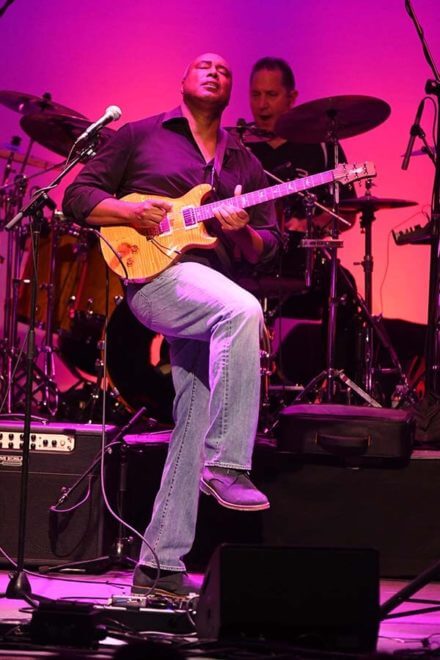
PHOTO: Bernie Williams playing guitar on stage. CREDIT: Bill Menzel
CM: Is the camaraderie you had with the Yankees similar to that with your band?
BW: We don’t really tour that much as “one” band. I perform with different “collectives”. A lot of the musicians are working on their own things so I have a list of people I can call upon. They are all familiar with the music and can play it with their eyes closed. But, there is a sense of camaraderie on stage. There are these great interactions that happen during the music and between solos that I enjoy a lot. To be quite frank, playing baseball is pretty individualistic. The celebrations and the interactions don’t have a lot to do with the game. Those happen in “dead time”: waiting for the game to start, in between batting practice, interacting in the clubhouse, in dressing rooms. I have more of a team interaction when I’m playing with the band than I had as a baseball player.
CM: Are there any musicians you would love to “team up” with?
BW: Oh my God yeah, it’s interesting you say that because I am training myself with this mentality in which I think, “All music is good.” All interactions with all kinds of musicians are welcome. Within the backdrop of music, I meet and serve time with a lot of great musicians with seemingly different styles- but once you are in this space in your mind that you just know the language, you can adapt to play with different people and have a great time. That’s a lot of love, for lack of a better word. (Laughs) I think that is the best way I can describe it.
CM: But is there one particular artist?
BW: I don’t know, I am really quite open to experience different things, different people. For instance, a few years ago I was part of the tribute band that was playing in Connecticut to honor Dave Brubeck. Unfortunately he passed that week. They decided to still go ahead with the concert in his memory. I had an opportunity to play with his son, Darius Brubeck. We played Take Five and we played with a whole bunch of really heavy jazz cats. And I had a really really incredible experience the next day, when I went to Long Island, and I played We’re Not Gonna Take It with Twisted Sister. You talk about a contrast in styles! (Laughs) That’s where I get most of my enjoyment in this music experience – playing with different people and different genres, different places, and still be myself and have my own individual voice. So that’s pretty exciting.
CM: Now you are famous in two realms. Is it different as a baseball player than as a musician?
BW: That’s a really interesting question. Handling fame is about not letting it get to your head. Fame is fleeting and should not be part of who you are and you should not crave it. Fame is a byproduct of what you do. I think if you’re trying to be famous by doing something, then you’re doing it for the wrong reasons. With that said, handling fame is quite interesting because I experienced a popularity with one of the best baseball teams in the history of the big leagues, playing with the New York Yankees for all those years. We have an interesting fan base that is very passionate and is very, very strong willed and they are so immersed in the team that they treat you like family whether they know you or not. (Laughs) I have to make sure they have the best experience they can have. Within reason! I mean if you have a thousand people swarming you then I think it may be time to run away.
CM: And fame in the music world?
BW: Music is a little bit different, I think. You connect in a different way. When you speak in this language of music, you’re dealing with a lot of emotions and the subconscious. “Why do people like music?, and “Why do people like songs?” I think the connection, as strong as it is in sports is even stronger in music. Some of these artists write music that might be the songbook of your life growing up. That has to touch hearts and souls. When you meet fans you can definitely ruin their lives by not being accommodating. My dad and my mom really stressed that. Even when I was a young player in the minor leagues my dad always said, “You have to be nice to the fans. They make you or break you and they’re human too and you have to treat them nice.” And I was always thinking about that- “You have to be nice to fans.”
CM: Now I’m going to turn it around. People want to meet you ~from your side, is there anyone you would like to meet?
BW: The list is probably longer on my side! Most of the people I would try to meet are already dead! (Laughs) Like Louis Armstrong, Coltrane, Charlie Parker, composers of classical music, Mozart, Beethoven, Bach. What was in their heads that they were able to make such great music and be inspired, what was in their minds? It would be fascinating to meet Babe Ruth, people like that who were bigger than the game and transcendent.
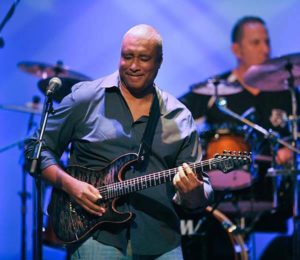
PHOTO: Bernie Williams playing guitar on stage. CREDIT: Bill Menzel
CM: I asked Steven Van Zandt the same question and he laughed at himself because he met everyone he wanted to and couldn’t think of anyone he’d want to meet.
BW: Oh my God (big laugh). He probably has a much bigger pool than I do, and resources, because he is an actor, a famous musician, a rock star, so I’m pretty sure that he is pretty accurate in what he’s saying.
CM: Back to music. Do you play any other instruments?
BW: No I have not been trained in other instruments. About two and a half years ago I graduated from the Manhattan School of Music with a degree in Jazz Performance. We had to take a little bit of piano as a compositional tool so I know the rudiments of how to make noise on the piano, but I wouldn’t go out there playing. I’m a pretty decent bass player. My background and my heritage of being Puerto Rican has made me grow up with the syncopated sounds of Latin music so I’ve always been fascinated with percussion and percussion instruments. It has been a steady influence. I kind of play with a percussive sense, meaning that I draw upon those Latin rhythms to play my rhythmic guitar, my solos- it influences everything I do musically.
CM: Speaking of percussion, my husband wants to know if Paul O’Neill is as good on drums as he says he is.
BW: Well if he says he is good, he’s probably not as good! (Laughs) I’m just kidding. I’ll tell you a story about Paul O’Neill. He came to the team in ‘93, in a trade that sent Roberto Kelly to the Cincinnati Reds and when he came, we didn’t know too much about him. He discovered that in one of those little storage rooms there was a drum set left by Ron Guidry who pitched for the Yankees. Ron never picked it up and the drums became the mainstay of the bowels of the stadium. So, the equipment managers, the grounds crew, they all played them. Paul started playing after batting practice, before the games, during rain delays. I was walking in a hallway toward the cage to get my hitting done and I heard a noise. I opened the door and it was him playing! So from that moment on I hooked up with him and I brought a small amp in to the storage room. It was just the two of us playing, in rain delays, after batting practice, every time we had free time, we would kind of look at each other, “Should we go jam? Yeah we should go jam!” Richie Sambora showed up one time and it was a really cool thing. Paul is actually a pretty decent drummer He can certainly keep a beat, a steady beat. He’s not very flashy, he won’t give you all these amazing rolls or anything like that, but he would definitely stay in the pocket and give you good beats to play, definitely.
CM: You wrote many of your songs. Do you enjoy writing as much as performing?
BW: Oh yeah, absolutely. Writing is almost like improvising, you just have all the time in the world to do it. And you have a chance to revise what you do. To me harmony is so fascinating because it’s a combination of notes put together to evoke a certain emotion. You can manipulate pitches and sounds to make someone feel happy, or sad, or angry, or pumped up, or melancholic, or somber. Music has the power to do all of that. And that’s why I want to get into all those great composers’ heads! You know? (laughs) Most people may never be able to understand the process but they recognize it maybe on a subliminal level.
CM: I’m wondering if you prefer studio recording?
BW: Studio recording is nerve-wracking because there is dead silence and everything has to be perfect. If you make a little mistake in the recording, you will hear it over and over and over again and it will drive you crazy. I feel like, “Why didn’t I fix this!” (Laughs)
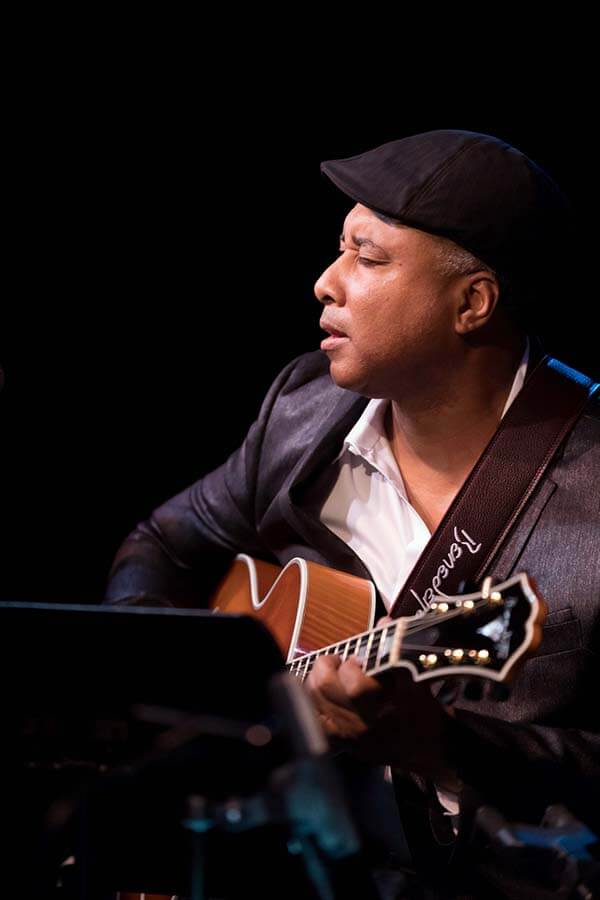
PHOTO: Bernie in concert at Cafe Carlyle in NYC. CREDIT: David Andrako
CM: Baseball, music and you even appeared on Seinfeld!
BW: Well that was a blast! (Big laughs throughout). That was great, that was awesome! I had my 15 seconds of fame there. It was me and Derek Jeter. George Costanza was trying to teach us how to play, how to hit. It’s my favorite scene, my favorite scene. It was really cool! I mean the experience of being on that show, at that time. It was at the peak of its popularity. It was certainly a great honor to be part of it. It was right after the World Series in “96 and we were at the top of the world. That was definitely the icing on the cake!
For Tickets to the show on September 8th, visit here.
Baseball Career
New York Yankees Center Fielder – 16 Years
Signed in 1987 after high school
Major League Debut – May 1991
Four-time World Series Champion
Five-time All Star
Four Gold Gloves Awards
Most Post-Season RBIs
Six American League Pennants
1998 American League Batting Title
1996 ALCS MVP Award
Number 51 retired and Plaque in Monument Park- May 24, 2015
Musical Career
The Journey Within CD 2003 – #3 on Billboard’s Contemporary Jazz Chart
Moving Forward CD 2009 – #2 on Billboard’s Contemporary Jazz Album
Singles – Go For It & Ritmo de Otono, consecutive #1 Billboard Singles
Latin Grammy Award Nomination: Best Instrumental Album, 2009
Manhattan School of Music, BA Jazz Performance
Author
Rhythms of the Game: The Link Between Music and Athletic Performance (Hal Leonard Books July 2011)
Philanthropy
National spokesman for NAMM (National Assoc of Music Merchants)
SupportMusic Coalition for Music Education
Appointed a Turnaround Arts artist, 2015 (by President’s Committee on Arts and Humanities, in partnership with the White House and US Dept of Education)
Raising Awareness for IPF (Idiopathic Pulmonary Fibrosis
Recommended for you
Kids with Cancer Need Help… Here’s What You Can Do
The daily burdens thrust upon families who are battling pediatric cancer are [...]
Monmouth County Historical Association Virtually Celebrates Annual Garden Party
FEATURED PHOTO: MCHA Executive Committee: (l to r front row) Kathy Jones (2nd [...]
Meet Your Neighbor: Stacy Wiener
FEATURED PHOTO: This is where caption text will go for featured photo. As [...]
Monmouth Film Festival Redefines the Festival Experience this August
As film and theater folk like to say, the show MUST go on, [...]
Meet Your Neighbor: Laura Ciccone, Educational Advisor
FEATURED PHOTO CREDIT: Cathy Padilla Laura Ciccone lives in Lincroft with her [...]
Pet Celebs: August 2020
Your pets can be celebrities too. Send in a photo to info@communitymagazinenj.com! [...]



